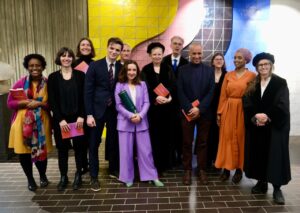7 July 2023
Nawal Mustafa will defend her PhD thesis “A Certain Class of Undesirables: ‘Race’, Regulation & Interrracialized Intimacies in Britain (1948-1968)” on 7 July 2023 from 11:45 until 13:15, in the Auditorium of the Main Building of the Vrije Universiteit Amsterdam.
Nawal’s dissertation addresses the period between 1948 and 1968 in the British metropole and examines the regulation of interracialised relationships during this time. The large-scale immigration from Britain’s former colonies to the metropole began after 1948, coinciding with the development of the British welfare state and job opportunities. The dissertation highlights the political and public discourse surrounding the settlement of colonial citizens, with employment, housing, and ‘miscegenation’ being recurring themes in political debates and media coverage.
Nawal specifically explores the national discourse on interracialized relationships, particularly between White women and Black men, which attracted political and media attention. The author argues that such relationships posed a threat to the racial order and the construction of a white British nation because they were seen as crossed racialised, gendered and class boundaries thereby challenging societal norms within Britain. The research expands on legal scholarship by exploring the ways control and regulation occurred across diverse social authorities, including non-governmental institutions. It demonstrates that regulation of interracialized relationships went beyond strict legal codes or the state itself.
Moreover, it presents a comprehensive analysis of the locations where moral regulation occurred by examining the interconnectedness of various governmental and non-governmental departments and institutions. It highlights how institutions such as the police, the church, and immigration agencies played a role in regulating interracial relationships. By situating the analysis of UK policy and governance within the broader historical context of the British empire, the dissertation aligns with postcolonial and decolonial scholarship. It emphasizes the interconnectedness of colonial and metropolitan spaces and contributes to understanding how interracial relationships were racialized within the empire.
Overall, by giving a thorough investigation of the regulation of interracialized relationships, contextualizing them within historical, social, and cultural processes, and examining the nuanced manners in which they were managed, the dissertation makes a significant contribution to the area of ‘mixed race’ studies.


